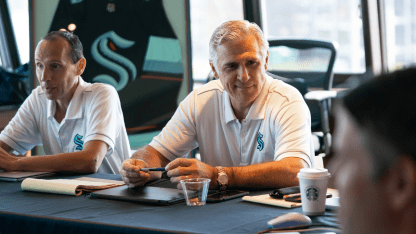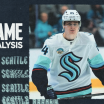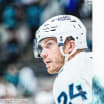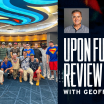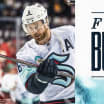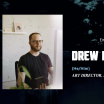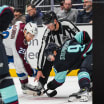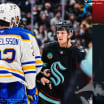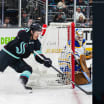This interview was conducted after Ron Francis’ general availability with the media on Mar. 8. You can view that discussion HERE. Some of those answers have been included below, as well.
You can view our Trade Deadline blog HERE.
What would you say about what the team has shown you, particularly in this recent streak of play (going 7-2-1 heading into Friday’s game)?
They have been what we thought. They’re a competitive group and a resilient group. It hasn't been an easy season with the amount of injuries we've had, and things we've had to deal with. But, they continue to fight and battle and here we are in March playing meaningful games as we go down the stretch. That's good for our young players. It's good for our fans. It's good for our veterans to be in those kinds of positions. So that (has been) good.
What can you share about your process these past couple of weeks with the team is in the playoff hunt, but you need to manage short-term goals but also long-term goals as the franchise builds?
Yeah, you look at your team and you'd always like to add pieces, but then you look at what the prices are and, based on where we were in the standings (this year), to start giving up, first-round picks or second-round picks this year just didn't make sense for us. So, we did the things we did, and other than that we feel we're comfortable with where we came through (the deadline).
In our last Q&A, (assistant general manager) Ricky Olczyk outlined the steps of going through a trade: making it happen, making the call. But what can you share with fans about the process of hearing about a possible trade option, negotiating that trade, and actually seeing it through?
(Smiles) As a player, you're always scared to death that you're getting traded. And now that you're a general manager, you realize you make hundreds of calls, and maybe one deal happens or two deals happen. There's a lot of things that factor in: the (salary) cap; who has cap space; who doesn't have cap space; are you willing to eat money (by retaining salary); not eat money; what is the price; does the other team need what you're selling, or are you willing to pay the price for what the team is selling? There's a lot of things that factor in. There's a lot of discussions and with 32 teams, you may feel you have the best deal and somebody else might have something else that is better. It’s an interesting process.
The team did make two moves, the first was trading Alex Wennberg. What would you like to say about him and his time as a member of the Seattle Kraken?
Yeah, (I) really like Wenny. He's a smart player, a really good person. He and Felicia (Alex’s spouse) and their family are great people. We really appreciate everything he did for our organization, both on and off the ice for the time he was here, and we wish him nothing but the best moving forward.
With Wennberg gone, Jared McCann has slotted back into the center spot. What do you view as the options you have there to backfill that role beyond McCann? Will Shane Wright be seen an option at some point?
Shane is possibly an option. We really like where Shane is right now. We really like the way he's playing. Our focus on Shane is making sure that he's 100% ready to go when next season starts and he's in our lineup. That doesn't mean we won't see him before the end of the year, but there's no guarantee we will see him. We'll see where things go here as we move into the last month and a half.
The second move you made was to extend assistant captain Jordan Eberle for two more years. Why was that a priority?
He has been with us from day one. He’s a big part of our locker room. He’s a character guy, who is not only a good player on the ice, with a tendency to play well in the big games, he’s also a good leader in our locker room. How he handles himself as a pro, how he takes care of himself… off the ice is valuable for the young players. He's easy to talk to for our young players, he's just that kind of guy. He's a quality person, he's a good hockey player, and he's a big part of our leadership and our locker room so I was glad that we're able to keep them on board.
Now that the deadline has passed. Do you take on any communications with the team, with the players? Is that more something the coaches handle?
It all depends. In our first year, we moved a lot of players out. So I was down in the (locker) room having conversations with players explaining that we wanted to retool over the summer. And then, I think being able to do what we did that summer and have the success we had in year two built a lot of belief in the players that ‘okay, they said what they said and they backed it up.’
Also, Hak (head coach Dave Hakstol) has a pretty good handle on what the team might need and Jordan Eberle and the other leaders we have in our team have a good handle, so I don't think there's anything I need to say today to them. I think it'll be taken care of.
What kind of communication have you had with the coaching staff leading up to the deadline? Does that factor into your decision-making?
You have a lot of conversations there. Coaches are a little closer to (the day-to-day ups and downs). There's a second layer (a little more separation) for the GM so there's always a little bit more emotion around the coaches. You have discussions on what you might be looking to add and you get their opinion and if, in their minds that fits in. You're having discussions on what you might be looking to subtract and how they think that affects your team. They work hard every day and certainly, they have a valuable opinion. It's one that we include in our decision-making process.
As a three-year-old team, how important was it to keep adding to that draft pick pool and have that currency for future drafts?
Well, I think it never hurts. I think we've, you know, going into this draft and we've already got 32 prospects in the pipeline. So that's a lot in a short period of time. You only get seven draft picks a year, so (if we only had those picks), it would equal 21 prospects for us and we're at 32. I don't know if it was as important to add more picks, but it certainly gives you options as you head into the summer that if you want to move some picks for a player, now you have some extra draft capital to do that.
You want to make sure guys are available for the AHL playoffs if that happens so we, as we say “papered” Ryker Evans (on Friday prior to the deadline) meaning we sent him down to Coachella (so he was on that roster at the time of the deadline making him playoff eligible) and then we recalled them.
You're only allowed four recalls after the trade deadline unless you're in an emergency situation. So that burns one of our four but, if we get to the point where we're no longer playing and Coachella still is, we do now have the option at that point to send (Evans) down to playoffs.
I think a lot of people might envision the trade deadline as you in your office with a phone, but you obviously have a team of people you're working with throughout. Are there certain teams or skill sets that deserve recognition in going through a trade deadline?
We do everything as a team, right? I have an assistant management team that are here; I have a director of pro scouting that we're talking to. We have an R&D team that factors in, we have an amateur scouting staff and part of our development staff (involved as well). All these pieces we communicate with during this process because there's a lot of things that have to be discussed and decided. For instance, our director of development is closest to our prospects, so if we’re discussing if there is there someone we would give up or not give up (in a trade), we're having those conversations. (We talk to our) amateur scouts and what they’ve seen in the draft, (we talk to) our pro scouts about what they've seen in the American League or the NHL. So, there's a lot of things that factor in, and we try to incorporate all our people to make the best decision for the organization.
And last one that I always ask is, is there anything about this process or this specific deadline that you want to share that I haven't asked you about?
It was an interesting one to watch. Some of the moves and some of the things…it’s a little surprising to me that we're getting into picks in the 2026 and 2027 year - that was kind of interesting to see these last few days. But other than that, it was kind of business as usual.
This transcript was lightly edited for brevity and clarity

